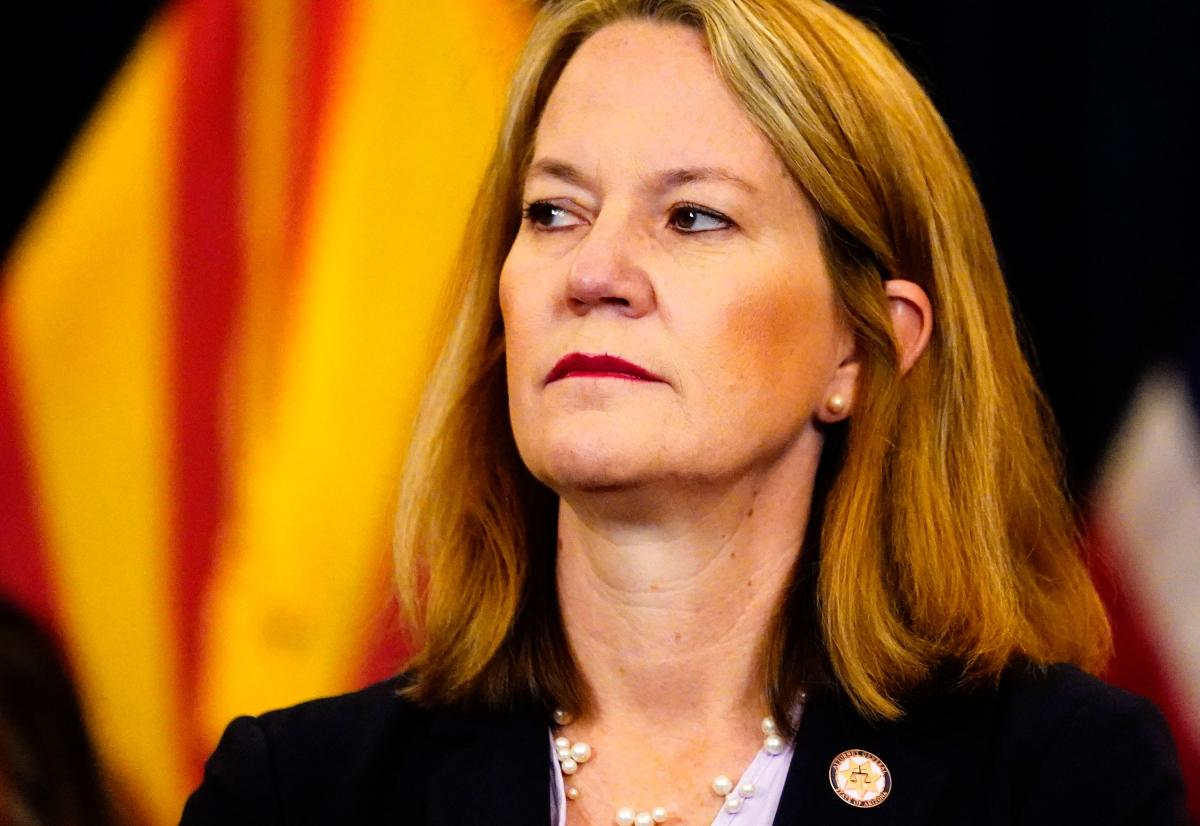In a leaked phone call on September 10, Arizona Attorney General Kris Mayes admitted to Arizona’s Governor and Secretary of State that the 18 individuals she is prosecuting for questioning the 2020 election results did nothing wrong.
This startling revelation adds further weight to claims that the case is politically motivated.
The defendants, including notable figures like former Trump White House Chief of Staff Mark Meadows, Rudy Giuliani, and Trump campaign adviser Boris Epshteyn, were indicted earlier this year.
The charges stemmed from their involvement in contesting the 2020 election results and proposing an alternative slate of electors for Donald Trump.
The indictment includes charges such as conspiracy, fraudulent schemes, and forgery. It alleges that the defendants conspired to prevent the lawful transfer of power and to influence Vice President Mike Pence to reject the Biden-Harris electoral votes on January 6, 2021.
Arizona is one of seven states where Republican electors sent in uncertified votes for Trump.
However, Mayes’s admission during the phone call further undermines the credibility of the case. This comes on the heels of a court decision last month that allowed the defendants to argue that the charges against them are politically driven.
With the AG now acknowledging that the defendants’ actions were not unlawful, the case faces serious challenges.
This controversy has its roots in a long-standing issue in Arizona’s election system. For 20 years, the state has failed to properly verify voter citizenship.
This error, primarily caused by the Arizona Motor Vehicle Department’s (MVD) system, allowed nearly 100,000 voters to be registered without verifying their citizenship status.
According to officials, these voters received driver’s licenses before 1996 and were able to register without citizenship documentation.
Arizona Attorney General Mayes, Governor Katie Hobbs, and Secretary of State Adrian Fontes discussed this problem in a private phone meeting. During this conversation, the officials expressed concern about how to break the news to the public.
Rather than address the issue directly, they allegedly orchestrated a legal strategy involving Stephen Richer, Maricopa County Recorder.
Richer, labeled as a Republican but widely criticized as a “RINO” (Republican In Name Only), was tasked with filing a “friendly lawsuit” to mitigate the situation.
Their plan involved asking the courts to downgrade the voting status of nearly 100,000 voters, primarily Republicans, to “federal-only” ballots, stripping them of their ability to vote in state and local races.
Arizona law permits individuals who cannot provide proof of citizenship to vote in federal elections only.This scheme, devised to avoid public backlash, has drawn sharp criticism from election integrity advocates.
The leaked phone call also reveals that both Mayes and Hobbs privately admitted that Arizona’s election system has been flawed for years.
Mayes even acknowledged that the last two elections in Arizona “are challengeable” due to the state’s failure to verify voter citizenship. Governor Hobbs conceded that this error supports claims about illegal voting in recent elections.
These admissions severely undermine the credibility of the ongoing prosecution of the 18 defendants. Many of those charged, including Giuliani, Meadows, and Epshteyn, argued that their actions were part of a legitimate election challenge.
Now, with Mayes’s own words casting doubt on the validity of the charges, the entire case is in jeopardy.
Kris Mayes, who narrowly won her position as Attorney General by just 280 votes in the 2022 election, is herself accused of benefitting from election irregularities.
Her opponent, Trump-endorsed candidate Abe Hamadeh, continues to challenge the results of that election. Hamadeh, who is now running for Congress in Arizona’s 8th District, reacted strongly to Mayes’s admission, calling it a “critical turning point.”
He urged Mayes to drop the charges against the 18 defendants, stating that her actions only further erode trust in Arizona’s election system.
In addition to Hamadeh, attorney Brad Miller, representing former Arizona GOP Chairwoman Kelli Ward, also criticized the case as politically motivated.
Miller, who is running unopposed for Pinal County Attorney in 2024, argued that Mayes is prosecuting individuals for what was, at its core, a legitimate election challenge. He accused Mayes of using her position to obscure the fact that Arizona’s election system is riddled with problems.
The phone call revelations have ignited debate in Arizona, with many calling for increased transparency and accountability in the state’s election process.
As the case against the 18 defendants moves forward, these admissions will likely play a significant role in shaping public opinion and legal outcomes.
Mayes’s acknowledgment that the elections were flawed, coupled with the politically charged nature of the indictments, raises serious concerns about the integrity of both the legal process and the election system in Arizona.

